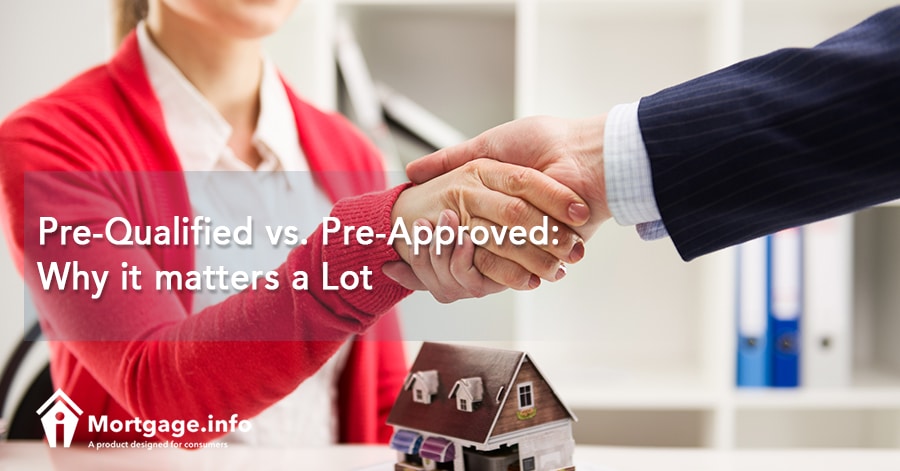Buying a new home is an exciting time. Before you step foot into a realtor’s office to discuss your needs for a home, though, you need to secure your financing. This is the crucial first step in order to make the home purchase process a success.
Get Matched with a Lender, Click Here.
You have likely heard that you need to be pre-qualified or pre-approved. They both sound rather similar. But are they? We are here to help you understand both terms and how they apply to you. Not understanding the difference could leave you without the financing you thought you had in the bag.
What is a Pre-Qualification?
You can look at a pre-qualification like an estimate or best guess. It’s the loan officer’s estimation of what you may be able to afford. There’s no concrete evidence behind it. In other words, the loan officer doesn’t look at any of your credentials to determine what you can afford.
When you sit down with your loan officer after asking for a pre-qualification, he will ask you some basic questions. They will pertain to your income, assets, credit score, and financial history. He is asking for your take on your financial position. Again, he asks for no evidence of this information.
Based on the information you provide, he will then give you an idea of what he thinks you can afford. This does not go before an underwriter or ran through a computer program. It’s an estimate of what you can afford. It holds no weight when it comes to making a bid on a home.
What is a Pre-Approval?
A pre-approval, on the other hand, is a much more stable answer to the answer ‘what can I afford?’ In this case, the loan officer ran your information through an underwriting system or with an underwriter. The lender pulled your credit and looked at your income documents. They then decided what you could afford based on the proof of your credit score, income, and possibly even your assets.
The pre-approval is not a concrete approval, though. It’s an estimate of what you can afford based on what the lender has seen thus far. Once you sign a purchase contract and the file goes to an underwriter, chances are that you will have more conditions you will have to satisfy. It isn’t until those items are satisfied that you are able to secure that final approval.
Click to See the Latest Mortgage Rates.
How Getting Pre-Qualified and Pre-Approved Can be the Same
There are a few similarities between getting pre-qualified and pre-approved. They are as follows:
- You’ll get a general idea of what you can afford.
- Neither one is a final approval; they both require more work by the lender
- They both show seriousness in your desire and/or ability to buy a home
- They can both help you stay within your budget when looking for a home
How Getting Pre-Qualified and Pre-Approved can be Different
When it comes down to the seriousness of buying a home, no seller is going to take a pre-qualification as enough evidence of your ability to secure a loan. Yes, it shows your seriousness in that you went to a lender to get preapproved. However, most sellers and/or realtors know that you are not fully approved or even partially approved until the underwriter looks at the loan.
The pre-qualification is more like the first step in the process. It’s getting your toes wet to see what you can afford. A lender can give you a lot of information based on your pre-qual alone. They can determine your estimated payment and even your estimated debt ratio. This can give you the information you need to decide if you are ready to buy a home. But that’s about all it does.
Once you are ready to put a bid on a home, you have to have that pre-approval letter in hand. This is especially important if you are in a bidding war. Even if you have a higher bid, if the seller isn’t sure about your ability to secure a mortgage, they make take the lower offer if that buyer has a pre-approval letter in hand. That’s why it’s so important to go that extra step and get the pre-approval.
Which One is the Right Choice?
When it comes down to it, you have to decide if the pre-qualification or pre-approval is right for you. If you are just first dabbling in the thought of buying a home, a pre-qual may suffice. You won’t need anything concrete any time soon – you just want an idea.
If, however, you are ready to hit the market hard and find a home now, you’ll want that pre-approval letter. Keep in mind that it’s only good for around 60 – 90 days. You don’t want to secure one so soon that it expires. But, you also don’t want to wait so long that you lose a bid on a home.
Figuring out what you need between the pre-qualification and pre-approval takes some soul searching. What is your logical next step? If it’s just window-shopping and not really being serious about bidding on a home, wait to have the lender pull your credit until you are more serious. However, if you are ready to jump on a home now, bite the bullet and get the pre-approval so you can buy your home.

